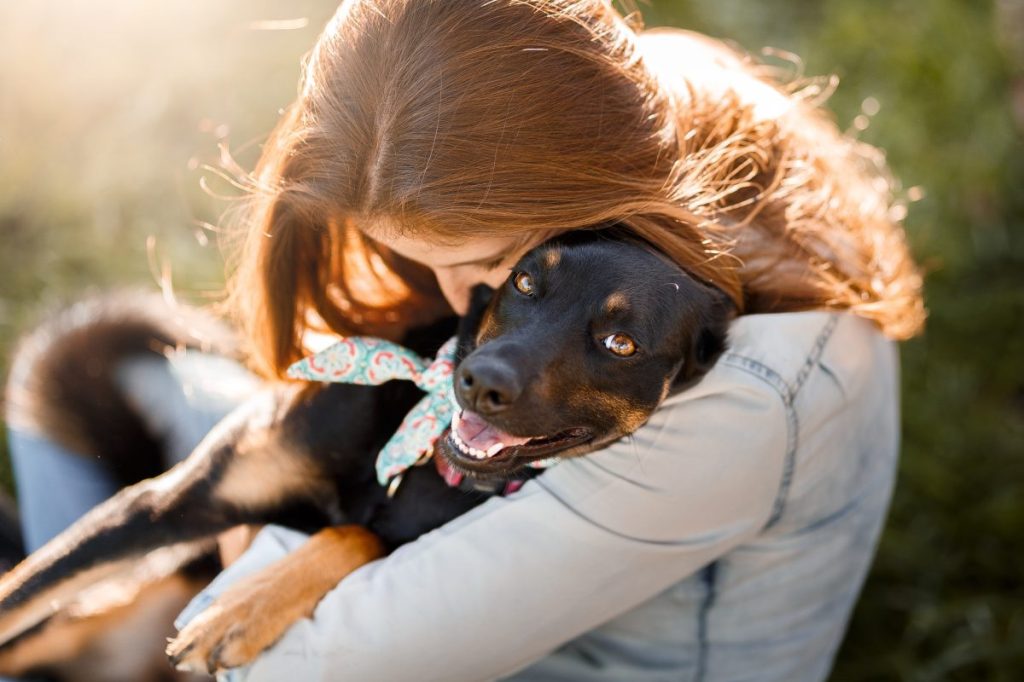Choosing to adopt a new dog is exciting. Even so, the decision comes with a myriad of choices to consider. Ensuring you take the time to weigh your options and research what caring for a wagging tail entails can make all the difference in the success of your pet adoption.
Before you rush into this life-changing decision, you should ask yourself a few questions to make sure you’re prepared. You also need to examine if your family and home are ready to welcome a pet. Equally important, you need to know how to tell if you’re picking the right shelter or rescue group to adopt from.
Bringing home the right pup for you and your family requires forethought and research. It also demands you to be realistic about the level of care and attention you can provide for your four-legged companion. For instance, do you work from home or do you travel frequently? Are you comfortable hiring a dog walker if you’re in the office for long stretches of time? Do you have the bandwidth to care for a dog with disabilities? What about a high energy breed who needs lots of physical activity? Would a senior pup who likes hours of couch time be a better fit?
To help you navigate the road to pet parenthood, we’ve compiled some initial questions to help you get started on this journey. Here’s what you should know before you adopt a pet dog or puppy.
Are you prepared to adopt a pet
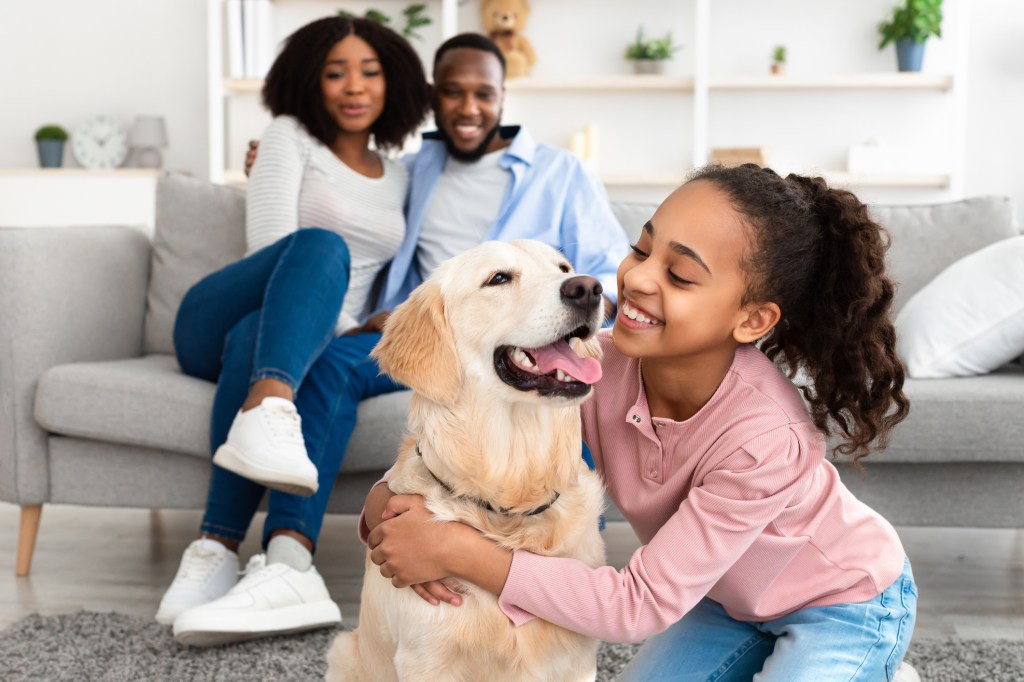
A dog or puppy is a huge commitment of time, money, and energy, and you need to make sure that you’re ready before you bring a pet home. Are you adopting this pup for the right reasons?
Bringing home a new pooch is a life-altering choice. You can’t just change your mind if you decide it’s too much work or costs more than you expected. (Believe us, it will, but it’s worth every red cent…and more.) As a dog parent, you must ensure you will be able to provide your dog with all of the necessities. This, of course, includes veterinary treatment. You’ll need to make time to get your dog up-to-date on vaccinations, possibly even taking off work to make it to appointments. If the expense of such is potentially prohibitive for you, there are options that exist for low-cost vet care in many places.
Equally important, you need to have patience when it comes to training. You’ll also need to exhibit grace under fire and be willing to continue teaching your pup even after they inevitably have a few accidents.
Are you already planning for the future
Responsible pet ownership means caring for your pet for the long term. Accordingly, you must consider a dog’s potential needs in the future — including increased healthcare costs, administering medication, and even purchasing ramps or stairs for an arthritic pup to get to their favorite spot.
Moreover, it also means making sure if you move apartments, that your dog can come with you to your next home. In the event that you get sick or are in an accident, it means having a plan in place so your pup has someone to take care of them if you are unable to do so. Pet parenthood is not something that should be entered into on a whim.
What age dog is right for you
Adopting a puppy is different from adopting an adult dog, and adopting a senior dog has its own challenges, too. Each developmental period brings with it a whole slate of specialized needs. Understanding the life stages of a canine companion may help you determine what age pet to consider for adoption.
Adopting puppies
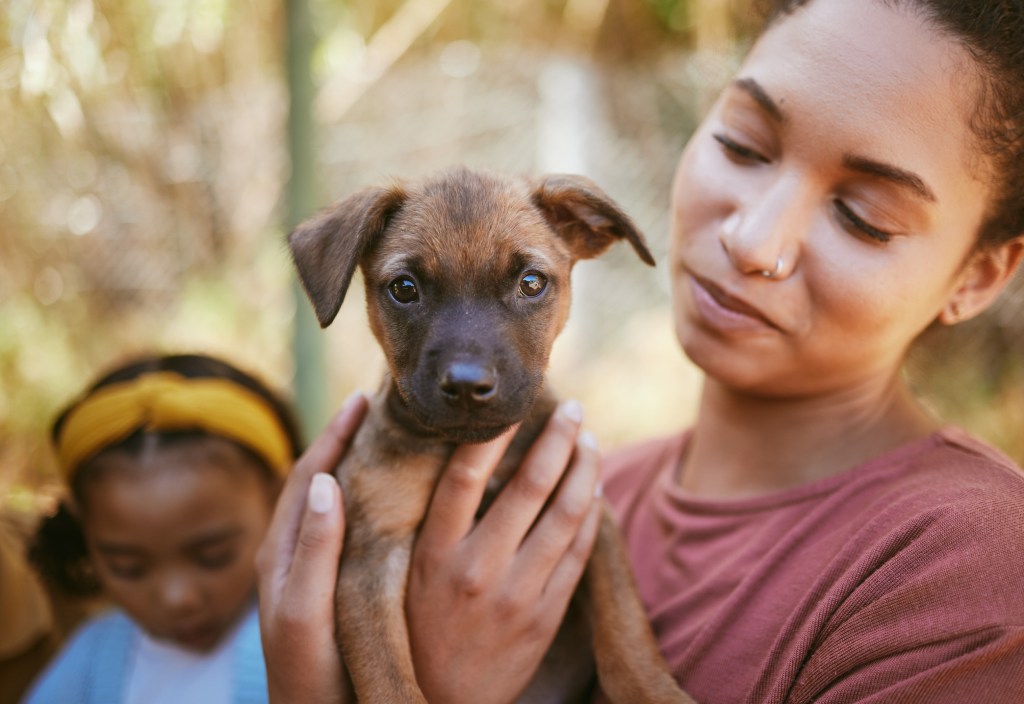
With puppies, you might have to factor in the cost of vaccination, spaying and neutering, as well as obedience training and socialization classes. You’ll need to purchase new equipment like leashes, bowls, toys, bedding, and more.
Puppies require a lot of stimulation and play, and also frequent naps. They may not be potty trained, so be prepared to clean up some accidents. For the sake of both your floors and your own peace of mind, you’ll need to commit to a training routine to reduce future instances of house soiling.
A puppy’s immune system is not always fully developed, and they may have medical needs that adult dogs don’t have. Resultantly, you will have to wait to take them to dog parks until they’ve had certain vaccines. This will reduce their exposure to diseases and illnesses they have yet to be treated for.
To learn more, read our guide on everything you need to know before adopting a puppy.
Adopting adult dogs
Adult dogs are usually up-to-date on vaccines and already spayed or neutered by their shelter. They tend to have a grasp on basic commands and may have started some sort of behavior training. And while these pups also tend to be housetrained, that’s not always the case.
Good shelters and rescue groups will often work with dogs in their care to teach them to be social and well-behaved, as it increases their chances of being adopted. This is something you should ask your local shelter about before bringing your dog home.
Adult dogs have exercise needs and require mental stimulation. It is important that you can keep up with them. You may have to hire a dog walker if you’re gone for most of the day or a pet sitter if you travel.
Adoption of senior dogs
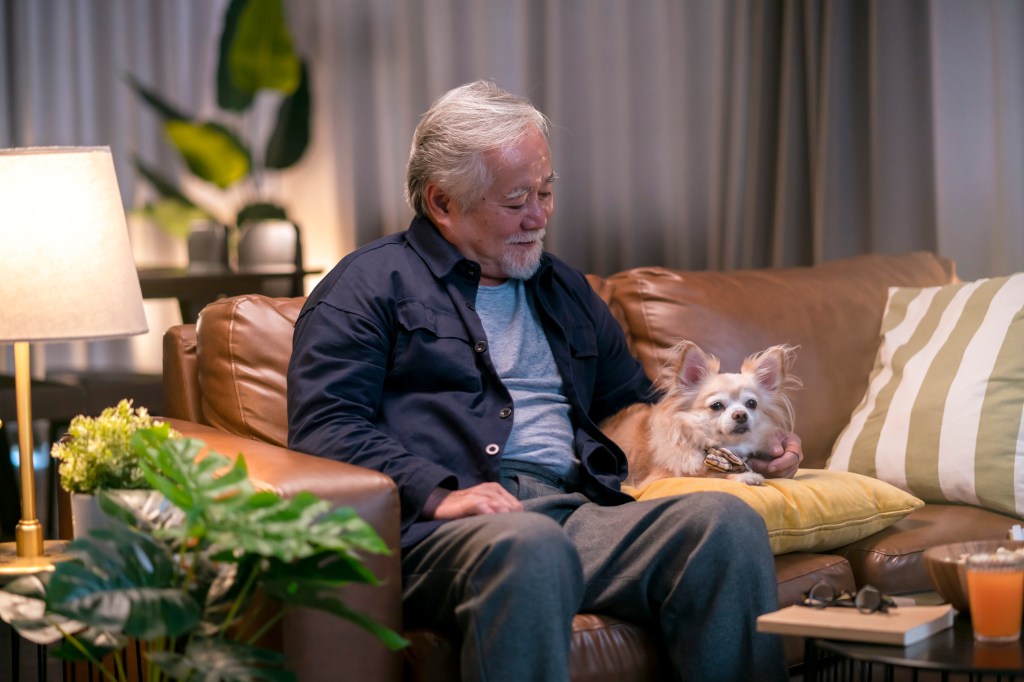
Senior dogs tend to be more relaxed. While their exercise needs may not be as extreme as puppies or adult dogs, they do sometimes come with health issues that must be addressed. You will also have to be prepared for end-of-life care.
That said, senior dogs tend to be more used to living with humans and are able to become very attached easily. They make for great cuddle buddies, and they are often a dog of choice for senior owners who want a loving pet with a manageable energy level.
Is your family ready for you to adopt a pet
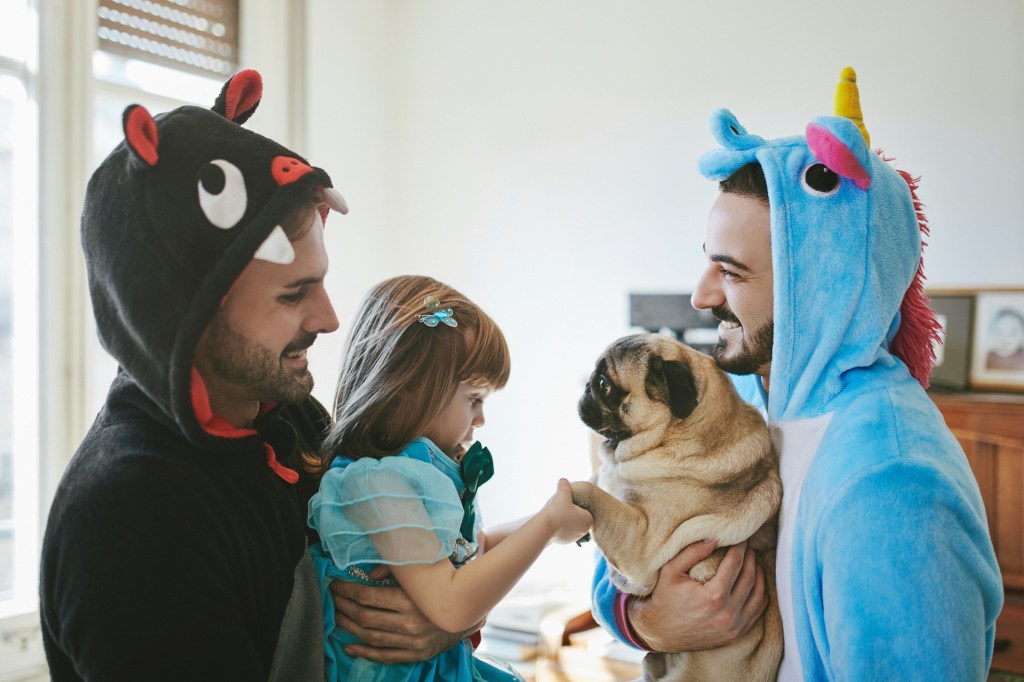
Before you bring a dog home, you need to have a good, long talk with your family. Make sure everyone is on the same page, and that everyone’s responsibilities are made clear. Who will be the primary caretaker? Who will do the feeding, the bathing, the walking, and so on? Dogs need routine. Accordingly, establishing a schedule early-on is critical to the success of your dog’s adoption.
Once your human family is on board, you also need to make sure that your other furry family members, if you have any, are ready. If you already have dogs or cats, make sure they are capable of getting along with other animals. Learn how to safely introduce a new pup to your resident felines. Understand how your existing dog or dogs will react when another pup enters their domain. Consider visiting a dog park or have a friend bring their pups to your house for a visit. Would your pets get used to sharing the attention and resources? Make sure you know how to make a good first impression when bringing a new dog home, so that all fur family members can get off on the right foot…err, paw.
Is your home ready for a dog’s adoption
Do you live in an apartment? Is your condo dog-friendly? In either case, figuring out the breeds which thrive in homes without regular access to a secure, grassy area is important. If you have more space for your pup to roam, are there wild animals and predators to be aware of? What steps will you take to safeguard your yard for your dog? Are you prepared to install a secure fence?
When it comes to getting your home ready, you have some more decisions to make. Where will your new dog sleep? Are some furniture items or rooms off limits? Where will your dog go potty, and who will clean it up?
Stock up on supplies like crates, doggy beds, food and water bowls, collars and leashes, toys, cleaners for accidents, and maybe even baby or dog gates to block off certain areas.
Remember that puppies tend to have accidents, so you may want to set up a play area on a room with a hard surface floor for easy cleaning. You should also read more about preparing your home for a dog.
What kind of dog or puppy should you adopt
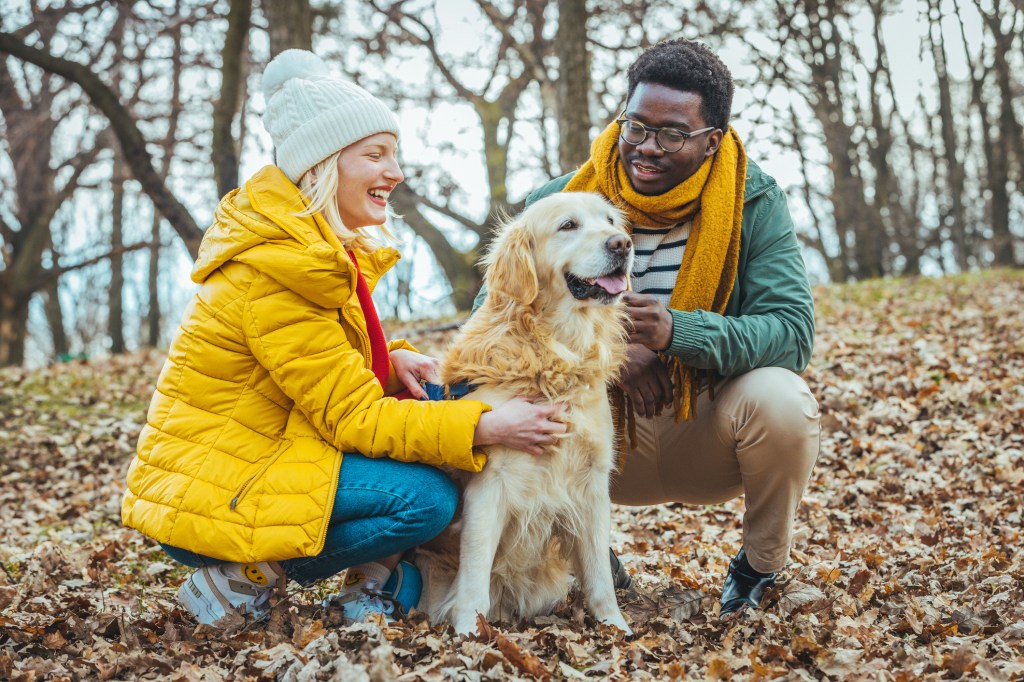
There are many things to consider when choosing between a dog or puppy for adoption.
Think about your living space. Is it big enough for a large, energetic dog, or would it be more appropriate for a small, mellow dog? Do you have a big yard or open space for running? Or do you need to walk your dog outside on a leash every time they need a potty break?
Some apartments and condominiums have weight limits for dogs. Make sure that if you get a dog who isn’t fully grown yet, their size won’t be a problem in the future. Similarly, some places also have restrictions on breeds residents may own. Be sure you’ve done your research prior to adopting your pup.
Different breeds have different medical needs, energy levels, and natural abilities to adapt to training and socialization. Some dogs are predisposed to medical conditions that may require a larger financial obligation. Other dogs are highly energetic, requiring physical and mental stimulation or they’ll become destructive. Perhaps you need a dog who likes to go for long runs or who can catch some waves with you.
If you have guests in your home often, you’ll want a dog who’s more socially adaptable and able to be trained to not jump on new people. You’ll also want a dog who doesn’t hump houseguests.
Of course, you can always consider bringing home a lovable mutt. They tend to have fewer health problems related to heredity and inbreeding because they tend to be more genetically diverse. A lot of mixed-breed dogs get the best qualities of both parents. This is known as hybrid vigor.
Which shelter or rescue group should you use for adopting a pet

The important thing with any dog is to meet them in person and make sure you have a connection. There’s nothing that can give you a better indication of the dog that’s right for you than a real-life introduction. That’s where a shelter or rescue group comes in.
Some people steer clear of shelters or rescues because they believe the dogs there aren’t “good” dogs. Nothing could be further from the truth.
- While many dogs are surrendered for behavior problems, the vast majority of those problems could have been prevented. Moreover, they can often be treated and addressed with training, attention, and exercise.
- Many dogs are surrendered because of a family’s change in circumstances — a move, financial loss, illness, or blending of families — and not because of the dog.
- Some people don’t realize how much time and work puppies — and even adult dogs — require and become fed up with the responsibility.
You can find a good fit for your home by carefully evaluating a shelter dog or puppy and introducing them to every person who lives with you.
Shelters
Shelters house animals available for adoption, as well as strays. Usually they’re at least partially funded by their city, but some are completely dependent on private donations. The quality of shelters varies dramatically, depending on where they’re located and how much funding they receive.
Some shelters provide basic medical care, training, and spay/neutering. Others are more like holding pens than shelters and don’t bother with the kind of care experts believe is essential to a dog’s well-being, like daily walks.
- The population of available dogs usually changes quickly and regularly.
- At the best shelters, the staff take notes, and sometimes post them, on how the dog is doing. Some shelters do extensive tests to gauge a dog’s personality and what sort of home would be the best fit. Many more shelters do not, and you’re on your own.
- Some shelters allow people to put a hold on dogs they want to adopt. Before you lose your heart to a dog, make sure someone else doesn’t already have a claim on them.
- Some shelters euthanize animals when they get overcrowded. Many no-kill shelters will only accept dogs believed to be adoptable — i.e., those who don’t have aggression or health problems and are younger.
- If you’re interested in a dog, make sure you ask how much longer they have at the shelter. That is, do you have a long time to make your decision, or is euthanasia scheduled in two days?
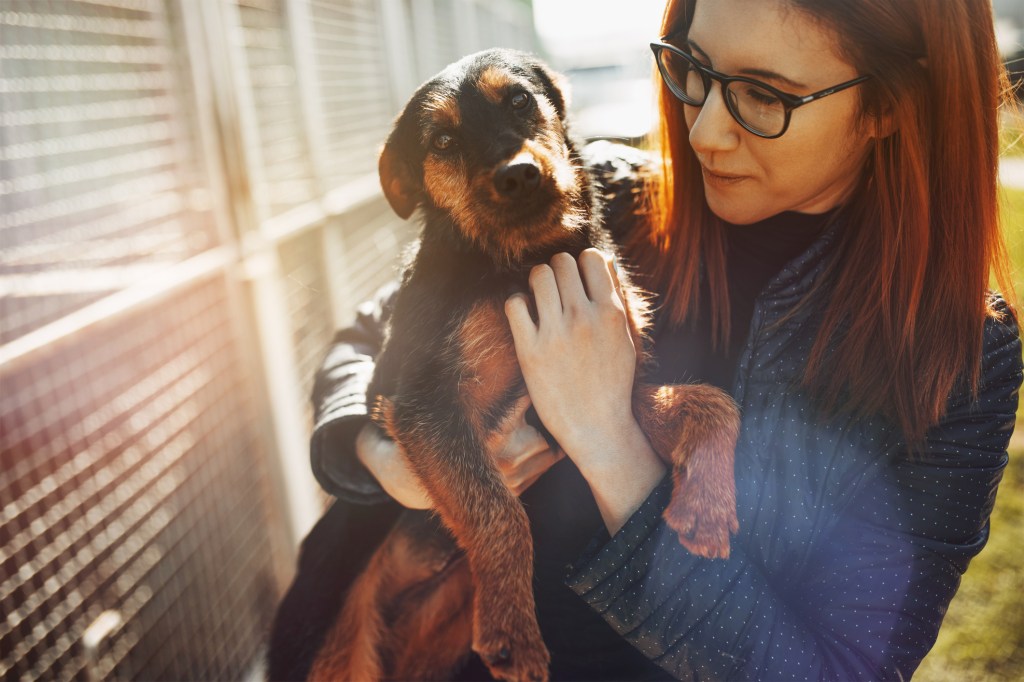
Rescue groups
Rescue groups are organizations that take dogs out of shelters and keep them in foster homes, and sometimes private kennels, until homes can be found. Some are breed specific, while others take all types of dogs. Rescues also tend to be choosier when it comes to who is allowed to adopt the available pups in their care.
Overall, they tend to give the dogs more medical and behavioral care than many shelters.
- Dogs are happier in foster homes than in shelters, so it’s easier to assess their personalities. You’ll already know how they’ll act in a real home setting.
- You can get a good idea of the dog’s temperament and habits from the foster family, since they live with the dog.
- The dog is not likely to be euthanized, unless they display serious aggression or health issues.
- These groups often have adoption events at public places such as pet supply stores, so you can drop by and meet several dogs. If you’re interested in a specific dog you’ve seen on the group’s website, you can ask for that dog to be brought to the event.
If the time for adoption is right
Now that you’ve learned more about what it takes, do you think you’re ready to adopt a pet pooch? Remember, each dog is different, from their personalities to their unique needs. Utilizing this list of questions is an ideal jumping off point for ensuring your journey into dog parenthood is successful — whether this is your first pup or your fifth. Brushing up on how to give your pooch the best life possible is a sure-fire sign that you’re ready to welcome a new dog into your life.
